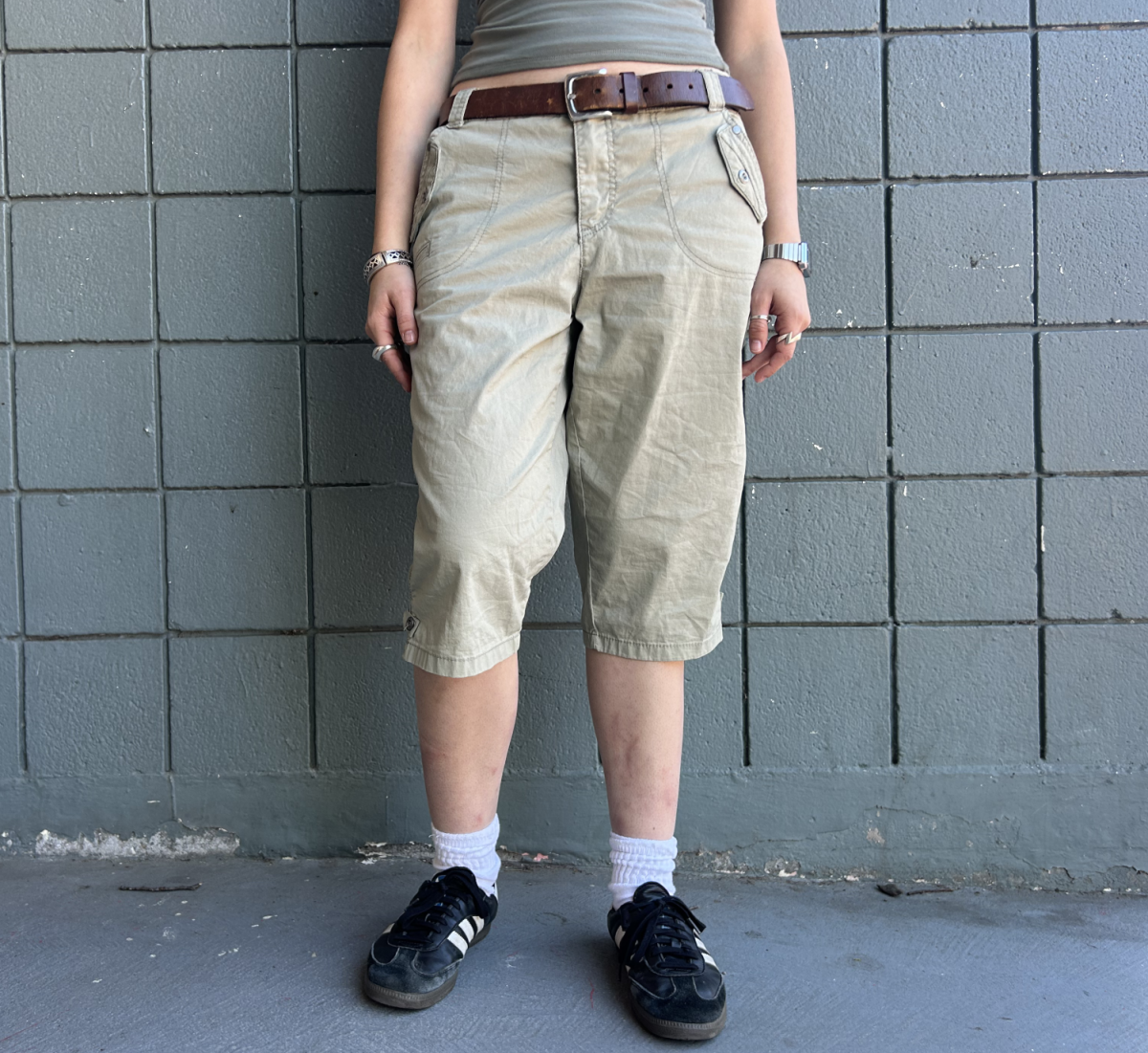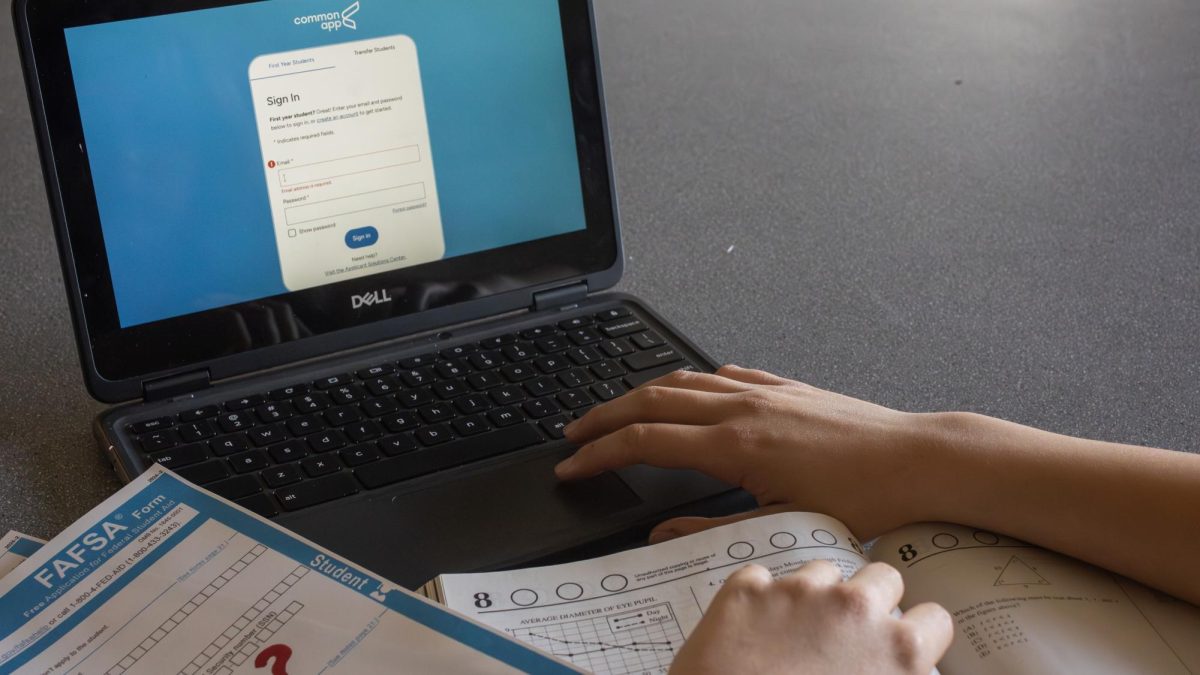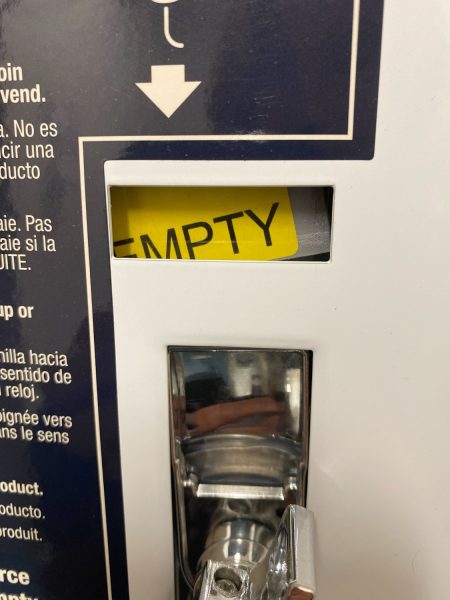
Junior Fiona Fitzsimmons rushes through the halls after school. As a member of Lowell’s girls soccer team she only has a few minutes to make it to practice; and she just got her period. She doesn’t have any products in her bag today, and with all the offices locked up for the night she only has one place left to go. Finding a pad or tampon in the school bathrooms should be easy as each bathroom is meant to have its own supply of menstrual products, but as Fitzsimmons moves from one empty dispensary to the next she begins to lose hope. Feeling let down by the school bathrooms, Fitzsimmons resorts to asking the few remaining students at school for a pad or tampon, and now she’s late for practice.
Fitzsimmons is just one of many Lowell students who have found themselves challenged due to a lack of adequate access to menstrual products at Lowell.
With a student body of 2,800, there are many menstruating students at Lowell. Despite the introduction of new policies that seek to make it easier for all menstruating students to navigate school as well as their periods, many Lowell students do not yet have easy and adequate access to pads and tampons. California laws have been more progressive than many states in advocating for menstrual equality in California public schools, and Lowell is one of a number of schools making efforts to adapt to those laws. However, SFUSD’s inability to follow through with these efforts along with a lack of schoolwide communication concerning the issue have led to a shortfall of adequate access to menstrual products at Lowell. Inadequate access to clean and free period products has begun to not only pose an inconvenience to Lowell students, but possible health concerns as well.
Despite the fact that around 26 percent of the global population menstruates, acceptance of menstruation and movements to support those who menstruate are still finding footholds in society. It was not until 2021 that the California Legislature passed California Assembly Bill No. 367, requiring all public schools with any combination of classes from grades 6-12 to supply an adequate amount of free menstrual products in “all women’s restrooms and all-gender restrooms, and in at least one men’s restroom, at all times,” and the bill didn’t officially take effect until 2022. A tax on menstrual products as a “non necessity” known as the “Tampon Tax” existed in California until being slashed by a California bill in 2016. Although some measures have been taken to make healthy and sanitary menstruation products more accessible in schools, these support systems have been slow to sustainably support Lowell students.
Lowell initially responded quickly to the new law. However, Lowell students have found the main issue to be an inability to continue to supply products as time goes on. Upon returning for the 2022-23 school year, many Lowell students noted the new presence of pad and tampon dispensaries in the female and all-gender bathrooms, along with a posted copy of the bill that required them. It didn’t take long for the products to run out, however, and soon the familiar yellow “empty” sign loomed in each bathroom.
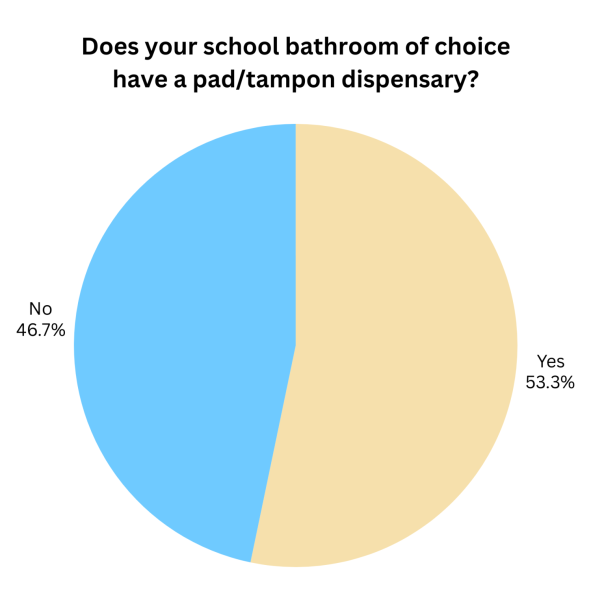
Now, moving into December of the 2023-24 school year, it has been almost over a year since Lowell students have seen their dispensaries full – and Fitzsimmons isn’t the only one who has found herself inconvenienced by the lack of period products. In a 2023 survey, 53.3 percent of Lowell students admitted that they felt their bathroom of choice supplied them with little to no adequate access to menstrual products. 61.5 percent of students using female bathrooms reported that their bathroom dispensaries were never stocked, as well as 100 percent of students using male bathrooms and 62.5 percent of students using all-gender bathrooms. Not only did a majority of Lowell students report feeling dissatisfied with the supply of menstrual products in their school bathrooms, when asked if they could afford to buy menstrual products outside of school, 13.3 percent reported that they could not and 33.3 percent reported that they could only afford to some of the time.
Regardless of income, all students who menstruate rely on adequate access to menstrual products to maintain good hygiene and health. Supplying students with menstrual products in schools allows them the opportunity to change their products whenever needed. According to a pediatrician at UCSF, failure to change menstrual products not only leads to feelings of uncleanliness, it can pose a threat to a student’s health or, in extreme cases, their life. “Having clean access to period products is very important, not only for the cleanliness issue,” the pediatrician said. “Inadequately changing tampons increases the risk of Toxic Shock Syndrome, which can be life threatening. Period products should absolutely be available in all restrooms, regardless of gender.” 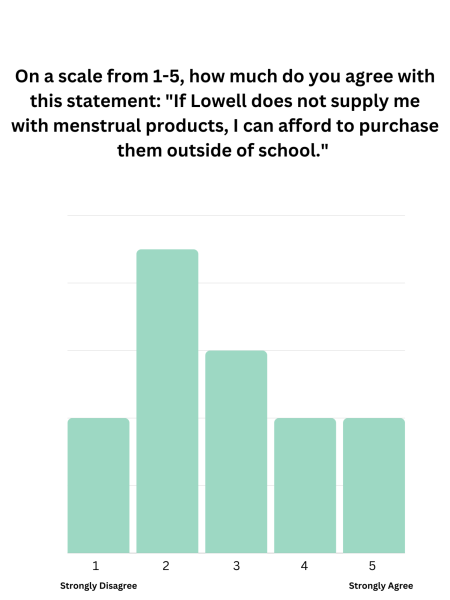
In addition to health concerns, Lowell students have been quick to label the constant absence of period products as irritating and inconvenient. “I rarely ever see them stocked in the bathroom,” Fitzsimmons said. “I don’t think there’s been a time when it’s not been an issue.” Fitzsimmons’ attitude is shared throughout a large percentage of the Lowell student body, and when surveyed many students were quick to voice their discontent. “There are virtually no menstrual products available on campus for people who need them,” reported one student in a survey.
Another concern besides irritation has risen among the students: while most upperclassmen feel merely inconvenienced by the sudden decline in available products from earlier years, most underclassmen have never had the experience of being able to access menstrual products in their time at Lowell. Fitzsimmons says she’s worried for these new generations of Lowell students who have spent their time in highschool having to fend for themselves to get products. “Especially for the Freshmen who are learning everything and want to be safe in their brand new school,” Fitzsimmons said. “I feel like this [lack of resources] is not going to make them feel very good.” Senior student and president of Lowell’s Gender and Sexuality Alliance (GSA) says that she and the other GSA members have previously discussed the lack of products in bathrooms of all genders, and students across all grades are feeling the effects. “Not a single time have I gone to the restroom and looked at the dispenser and seen products available.” Gonzales said. The knowledge that the dispensaries were last restocked in the fall of 2022 leaves many students worrying about the comfort of the lower classes.
Not every member of the Lowell community has been aware of the current struggle of menstruating students at Lowell. Isaac Alcantar, Assistant Principal of Building and Grounds at Lowell says that he was never notified by staff or students that the dispensaries were becoming an issue. “I will say prior to [this interview], I was under the assumption they were being filled,” Alcantar said. “This is the first time it had been brought to my attention.” Despite his initial surprise, Alcantar was quick to propose reasons for why the dispensaries remain empty, his leading theory being a lack of materials but not in the way one would assume. Alcantar reported that he spoke to the supervisor of the custodial staff in charge of restocking products and got an unusual yet unsurprising response. “He told me that their staff didn’t have a key to the dispensaries,” Alcantar said. “Which would be… par for the course for some of our San Francisco Unified School District departments.” The new discovery made Alcantar more hopeful in Lowell’s abilities to directly address the problem.
In the absence of products in the bathroom dispensaries, some Lowell faculty members have supplied period products to the students. Many students were happy to report that in a pinch they have been able to find menstrual products at other Lowell resources such as the Wellness Center and the nurse’s office. Sixty percent of surveyed Lowell students said they had received menstrual products from the Wellness Center at least once, and 20 percent said the same of the nurse’s office. While both the Wellness Center and the nurse’s office are able to support students to an extent, the majority of Lowellites still feel underserved by the amount of products being provided by these two resources. “There are definitely other places to obtain menstrual products on campus,” one student responded in the survey. “However, they are often out of the way, inconvenient, or stigmatized.”
Another faculty member has taken a more direct approach to addressing the problem. Since first being interviewed about the issue, Alcantar says he has been in contact with other SFUSD employees to try to find a solution. “I had to put a request in for building and grounds to get them those keys, he [supervisor of custodial staff] then later told me they had them,” Alcantar said of the keys to the product dispensaries. “So it is my expectation that now they should be filled whenever they’re running low.” In the past, many students have felt unable to report when the product dispensaries are running low, but Alcantar has recently begun work in that area as well. Alcantar plans to “look into” adding resources to the school bathrooms that make it easier for students to make it known when a bathroom dispensary is in need of a refill. “I could look at adding a part on the Google Form I have for the bathrooms… if they’re missing any of the menstrual materials.” By adding the question of menstrual products to the pre-existing google form that serves as a way for students to alert faculty if a bathroom needs custodial attention, Lowell would make it easier for students to make it known when they are in need of menstrual products. This would lead to easier and more adequate access.
Lowell High School responded quickly to the passing of California Assembly Bill 367, and while students have noticed efforts to maintain the resources the bill promised significantly fall off in the past year, they are gradually making their way back. The dry spell of period products is something that many students have experienced for the majority of their time at Lowell, and one which affects a large part of the Lowell community. With many students losing faith in Lowell’s ability to maintain their promise of providing all students with adequate access to menstrual products, the actions that have recently taken place to once again begin working towards that goal are welcomed with open arms. Menstruating Lowellites agree that a support system of clean and accessible period products should be a crucial part of the high school experience, and they are excited to see their school follow through in providing it. “We’ve been trying to get to it,” said Alcantar. “It’s just a matter of ‘Hey let’s get this thing working right.’”









